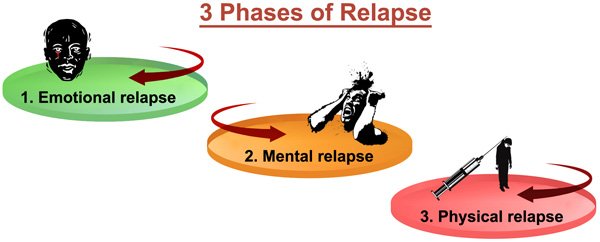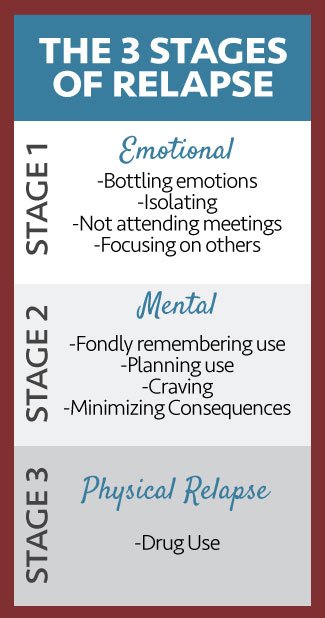
A relapse is defined as the reappearance of an illness or a disease after recovery.
There are 3 stages of relapse when we talk about recovery from addiction

Emotional Relapse
In emotional relapse, you're not thinking about using the said substance but your emotions are setting up a possible use of the substance in the future.
The signs of emotional relapse are:
Anxiety
Intolerance
Anger
Defensiveness
Mood swings
Isolation
Not asking for help
Not going to meetings
Poor eating habits
Poor sleep habits
The signs of emotional relapse are also the symptoms of post-acute withdrawal. If you understand post-acute withdrawal it's easier to avoid relapse, because the early stage of relapse is easiest to pull back from. In the later stages the pull of relapse gets stronger and the sequence of events moves faster.
Mental Relapse
In mental relapse there's a war going on in your mind. Part of you wants to use, but part of you doesn't. In the early phase of mental relapse you're just idly thinking about using. But in the later phase you're definitely thinking about using.
The signs of mental relapse are:
Thinking about people, places, and things you used with
Glamorizing your past use
Lying
Hanging out with old using friends
Fantasizing about using
Thinking about relapsing
Planning your relapse around other people's schedules
It gets harder to make the right choices as the pull of addiction gets stronger.
Techniques for Dealing with Mental Urges
Play the tape through.
When you think about using, the fantasy is that you'll be able to control your use this time. You'll just have one drink. But play the tape through. One drink usually leads to more drinks. You'll wake up the next day feeling disappointed in yourself. You may not be able to stop the next day, and you'll get caught in the same vicious cycle. When you play that tape through to its logical conclusion, using doesn't seem so appealing.
A common mental urge is that you can get away with using, because no one will know if you relapse. Perhaps your spouse is away for the weekend, or you're away on a trip. That's when your addiction will try to convince you that you don't have a big problem, and that you're really doing your recovery to please your spouse or your work. Play the tape through. Remind yourself of the negative consequences you've already suffered, and the potential consequences that lie around the corner if you relapse again. If you could control your use, you would have done it by now.
Tell someone that you're having urges to use
Call a friend, a support, or someone in recovery. Share with them what you're going through. The magic of sharing is that the minute you start to talk about what you're thinking and feeling, your urges begin to disappear. They don't seem quite as big and you don't feel as alone.
Distract yourself. When you think about using, do something to occupy yourself. Call a friend. Go to a meeting. Get up and go for a walk. If you just sit there with your urge and don't do anything, you're giving your mental relapse room to grow.
Wait for 30 minutes
Most urges usually last for less than 15 to 30 minutes. When you're in an urge, it feels like an eternity. But if you can keep yourself busy and do the things you're supposed to do, it'll quickly be gone.
Do your recovery one day at a time. Don't think about whether you can stay abstinent forever. That's a paralyzing thought. It's overwhelming even for people who've been in recovery for a long time.
One day at a time, means you should match your goals to your emotional strength. When you feel strong and you're motivated to not use, then tell yourself that you won't use for the next week or the next month. But when you're struggling and having lots of urges, and those times will happen often, tell yourself that you won't use for today or for the next 30 minutes. Do your recovery in bite-sized chunks and don't sabotage yourself by thinking too far ahead.
Make relaxation part of your recovery. Relaxation is an important part of relapse prevention, because when you're tense you tend to do what’s familiar and wrong, instead of what's new and right. When you're tense you tend to repeat the same mistakes you made before. When you're relaxed you are more open to change.
Physical Relapse
Once you start thinking about relapse, if you don't use some of the techniques mentioned above, it doesn't take long to go from there to physical relapse. Driving to the liquor store. Driving to your dealer.
It's hard to stop the process of relapse at that point. That's not where you should focus your efforts in recovery. That's achieving abstinence through brute force. But it is not recovery. If you recognize the early warning signs of relapse, and understand the symptoms of post-acute withdrawal, you'll be able to catch yourself before it's too late.
References:
Hi! I am a robot. I just upvoted you! I found similar content that readers might be interested in:
https://www.addictionsandrecovery.org/relapse-prevention.htm
But I am sure you saw the references